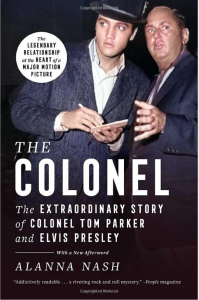Variety‘s Chris Willman to Colonel Tom Parker biographer Alanna Nash: “What’s your overall feeling on the movie’s truth-ometer? Are the liberties worth it for creating an artistic picture? Does it veer off in ways that seem unnecessary?”
Nash: “The timeline…well, what timeline? It’s all a Baz Luhrmann fever dream. The past, present and future are all shook up like a ’50s milkshake and served with a thousand straws!
“Other than the tremendous pains Baz has taken to make this story seem ‘woke’, the liberties are essentially fair — except to Parker. In making him such an antagonist, they have robbed him of his many accomplishments with his client.
“Luhrmann has really framed this through a present-day lens. Elvis had just as many white influences and announced as early as seventh grade that he was going to sing at the Grand Ole Opry. Remember, he entered a talent contest as a child singing ‘Old Shep’ — warbling about dead dogs is about as country as it gets. An early hero in Tupelo was a hillbilly singer named Mississippi Slim.
“But living in a ‘colored’ neighborhood, as [Elvis] did, he certainly heard early r & b, jump-blues and swing tunes pulsating through the walls at the nearby juke joints, and he loved it, as he did both Black and white gospel. Still, the odds were heavily in favor that he’d be a country singer and his stint on the Louisiana Hayride seemed to point him in that direction.”










